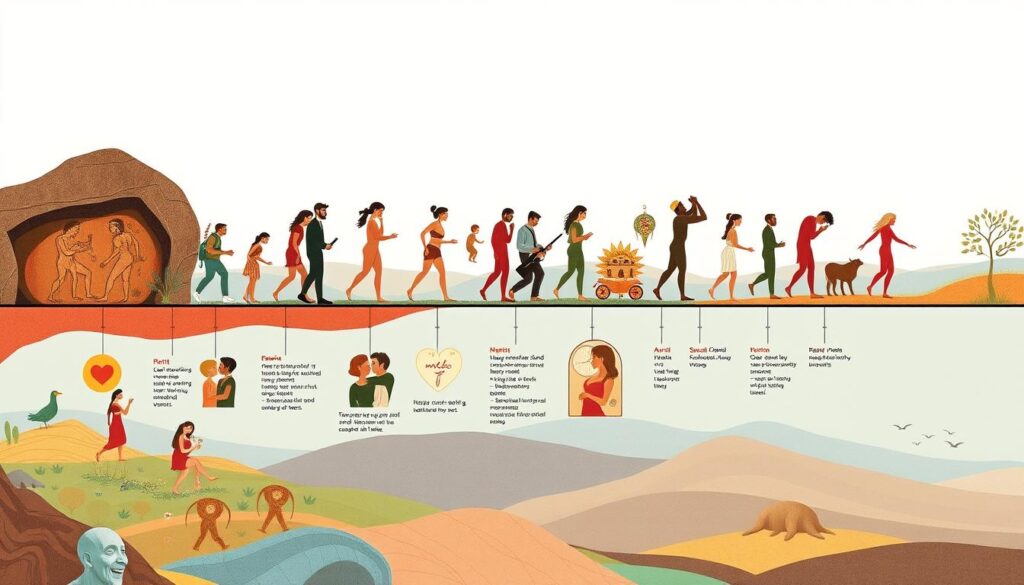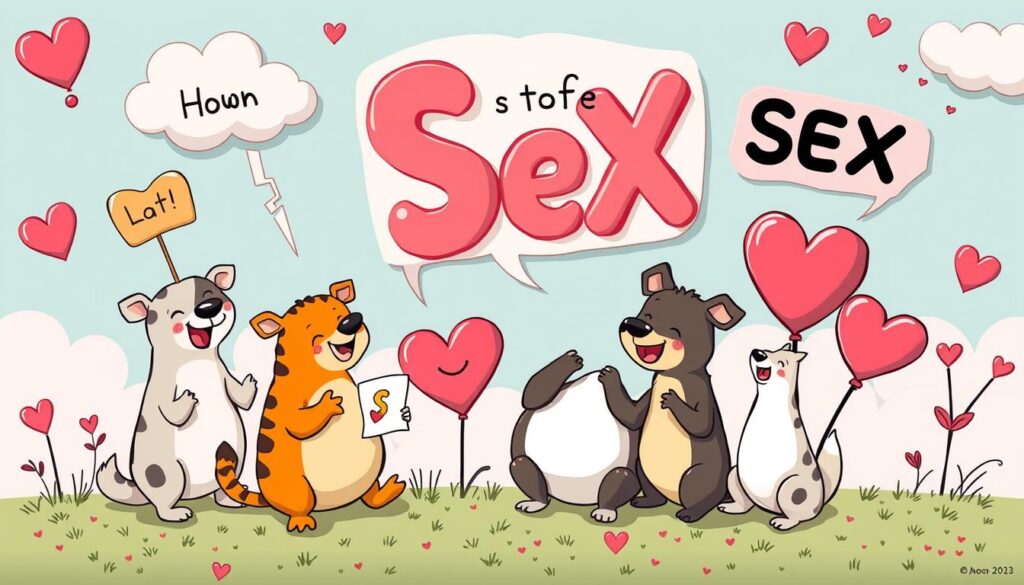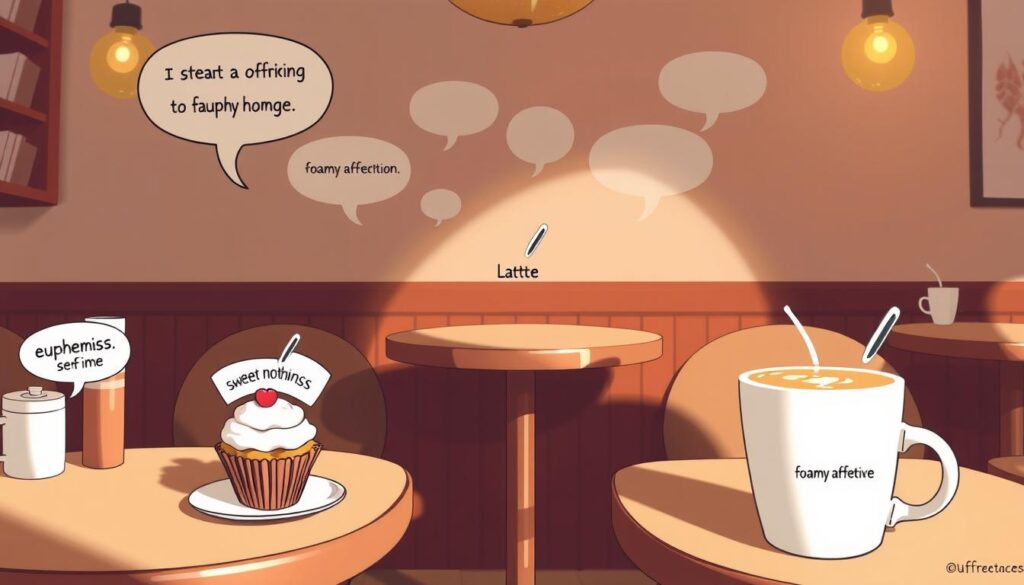Remember a time when you tiptoed around topics of closeness? Words hung like delicate threads in the air. Someone had to pull just right to make the subject easier. Discussing intimacy directly can be tough, but euphemisms for sex help lighten the mood. You’ve likely noticed how playful expressions make awkward talks fun and charming.
We’re going to explore different ways to talk about sex. This journey takes us through a rich language landscape that shows how our views on intimacy change. We’ll look at old favorites and new, quirky terms that could bring a smile to your face. This guide is here to help you expand your discreet vocabulary options. It’s useful whether you’re chatting with friends or sparking ideas for a project. Knowing how to talk about intimacy in many ways is a great skill.
Let’s start this adventure, learning how to discuss intimacy with confidence and style. The right phrase can make things light and build connections.
Key Takeaways
- Exploring euphemisms for sex allows for more approachable conversations.
- Language around intimacy has evolved significantly over the years.
- Categories of euphemisms can range from classics to fun, food-related expressions.
- Cultural attitudes greatly influence the language we use regarding sex.
- A rich vocabulary enhances your ability to discuss sensitive topics comfortably.
Understanding Euphemisms for Intimacy
Talking about intimacy often means using special words. Euphemisms help us discuss sex in a gentle way. They make it easier to talk about something that can be awkward.
Terms like “making love” or “hooking up” tell us about culture. They show how sexual language has evolved. For example, the word “f—” was first used for sex in 1508.
Euphemisms also allow for creative expression. With over 350 phrases, they range from classic to modern slang. This variety shows how language changes with society and individual tastes.
Knowing these special words for intimacy opens up new ways of communication. It helps us talk openly about sexual relationships. This can lead to better understanding in different situations.
The Evolution of Language Around Sex
The journey of sexual language covers centuries, influenced by cultural norms and society’s views. Over years, new terms for sexual acts appeared, showing how sex terminology evolved. “Cunt” first appeared in 1250, and “ballocks” in 1300. These early uses show how people talked about sex then.
As time went on, the way we talk about intimacy changed. In the early 1700s, “Venus’s honeypot” became a new way to say vagina. By the 1800s, terms like “quim whiskers” were invented for similar reasons. Later, phrases like “bacon sandwich” became common for female genitals. This shows how views on intimacy broadened, leading to varied and humorous sexual language.
Male genitals got fun nicknames too. In the Middle Ages, people said “fiddle,” “spindle,” and “pulling prick” for penis. Names like “bush-whacker” and “Captain Standish” came later. These terms show how conversations on sex terms kept evolving.
The word “fuck” has been controversial since 1508. Despite its explicit roots, it’s lasted for centuries. Jonathon Green’s “Green’s Dictionary of Slang” documents this evolution over five centuries with over 10.3 million words. It’s a deep look into how sexual language has changed.

Understanding sexual language’s history helps to see how and why euphemisms came about. Especially in times when talking about sex openly was taboo. This shift shows both society’s acceptance and rejection. Today, the wide range of terms helps us understand our cultural relationship with sexuality.
Classic Phrases: Timeless Expressions
Language shapes how we see intimacy. Classic phrases for sex have grown popular over time. This section looks at well-known terms and playful expressions. They symbolize romantic bonds, showing their emotional importance and cultural background.
Familiar Terms: “Making Love” and More
The term “making love” is a beloved traditional saying. It brings to mind a deep bond and romance. Other expressions like “I’m head over heels for you,” show love’s long history in language, dating to the 1300s.
Phrases such as “You’re the light of my life” and “You’re my everything” are short but deep. They express strong feelings of love and dedication, adding to the rich language of intimacy.
Fun Expressions: “Hanky Panky” and “Doing It”
“Hanky panky” and “doing it” add a light, funny touch. These classic sex phrases show a joyful view of intimacy. “Madly in love” captures the intensity of passionate love.
Phrases like “You make my heart skip a beat” share the thrill of romantic connections. Such expressions make a colorful language, helping people to connect deeply.

| Expression | Emotional Weight | Historical Context |
|---|---|---|
| Making Love | Romantic Intimacy | Contemporary Usage |
| Hanky Panky | Playful Fun | 20th Century Origin |
| I’m Head Over Heels | Passionate Affection | 1300s |
| You’re the Light of My Life | Deep Love | Modern Classic |
| Madly in Love | Intense Passion | Cultural Concept |
Alternative Phrase for Sex: Exploring Creative Options
Language makes talking about intimacy fun. It turns using food words to talk about sex into a game. This adds humor and makes conversations with your partner more exciting. Such playful expressions can make things lighter but also keep the spark there.
Charming Food-Related References
Talking about closeness using food terms adds a playful touch. Here are some examples:
- Baking the potato
- Getting one’s kettle mended
- Stirring the pot
These fun phrases build a connection. They bring laughter and creativity into the mix.
Unique One-Word Wonders
Single-word choices for sex can also liven up your talk. Words like “shagging” and “boning” are fun and straightforward. They make conversations more lively while keeping them light.

| Phrase Type | Examples |
|---|---|
| Food Euphemisms | Baking the potato, Getting one’s kettle mended |
| One-Word Alternatives | Shagging, Boning |
Creative language opens up new ways to talk about intimacy. It helps couples be more open and explore their relationship.
Humorous and Playful Terms
Talking about intimacy becomes more fun with humorous sex phrases. Playful euphemisms make conversations less awkward. They transform tense moments into something enjoyable.
Witty Phrases: “Bumping Uglies”
The phrase “bumping uglies” creates a fun image. It’s a light-hearted way to talk about sex, sparking laughter. It shows language’s power to bring humor into relationships. Witty phrases help people talk openly about their likes and wants.
Outrageous Sayings: “Rolling in the Hay”
“Rolling in the hay” suggests adventure and spontaneous fun. This saying paints playful intimacy, promoting a laid-back vibe. It shows how humor helps couples enjoy their connection more, making intimacy fun.

Cultural Variations: How Different Societies View It
Cultures around the world view and talk about sex in their own ways. They have deep histories and unique traditions. This creates special customs and words that show what they value. When we understand these differences, we appreciate global views on intimacy more. We’ll explore how different places have their own sayings for sex. This includes slang from various parts of the United States.
International Euphemisms
Each culture has a unique way to talk about sex. For instance, in French, “faire l’amour” means “making love.” In Spanish, “echar una cana al aire” translates to “to throw a straw in the air.” Through these sayings, we see how cultures view intimacy. Some places are more open or playful about it. In countries with more gender equality, attitudes toward premarital sex are more relaxed.
Regional Slang in the United States
Across the U.S., slang reflects our many cultures. Young people might say “hooking up” or “getting busy.” These phrases show a casual view of intimacy. But, in more conservative areas, people might use terms like “being together.” Each region’s culture shapes how they talk about sex. Where traditional values are strong, the conversation is more guarded. Yet, cities often use a broader mix of terms and ideas.

Why Using Euphemisms Can Be Beneficial
Euphemisms can really help when we talk about intimate matters. They make conversations about sex less awkward. This way, everyone feels more at ease to chat openly.
Euphemisms also make it easier to talk about sex discreetly. They help to discuss such topics gently and politely. This is especially good in situations that need a bit of delicacy.
Using different phrases can make learning about sexual health simpler. It’s a great way to teach topics that might be hard to discuss directly. This makes people more willing to listen and learn.
Moreover, euphemisms allow for creative ways to express ideas. Writers and speakers use them to convey deep messages without harsh words. This enriches language and helps listeners understand complex issues better.

Overall, euphemisms bring big benefits to our chats. They make discussions about sex more comfortable and private. They also make it easier for people to learn and understand sensitive topics.
Situations Where You Might Use Alternative Phrases
Alternative phrases for sex can make conversations lighter. They are useful in daily talks and creative work. These euphemisms help make talks about intimacy more relaxed.
In Everyday Conversations
Using sex euphemisms in conversation makes things less awkward. They make it easier to talk with friends or new people. Below are some examples:
- “I heard they finally decided to take their relationship to the next level.”
- “She mentioned they had a fun night together—sounds like they really clicked!”
- “Did you get the impression they’re cozying up?”
In Creative Writing or Media
Alternative phrases in writing add depth to stories. They let writers express sexuality without being too direct. Here are some ways they’re used:
- Romantic novels might describe a couple as “dancing in the sheets” or “getting lost in each other.”
- Screenwriters use indirect terms for intimate scenes to keep a wider audience.
- Relationship blogs and articles use creative language to discuss intimacy.

Conclusion
In summary, we’ve dived into different ways of talking about sex. These phrases help make talks about closeness more detailed and relaxed. From well-known sayings to fun slang, each choice reflects personal and cultural views. Plus, they show how key language is in discussing intimacy. Learning about these options makes conversations more engaging.
Our research shows many reasons why people are intimate, like forming emotional connections or boosting self-esteem. As you learn about these euphemisms, remember their power. They help improve how we talk, make our intentions clear, and build understanding between partners. Using them can make intimacy even better.
Using new phrases for sex in your talks and writing can empower you and others. It shows the wide range of terms for talking about sexual matters. With this knowledge, you can talk about sex with confidence and kindness. This can make your connections with others stronger.










